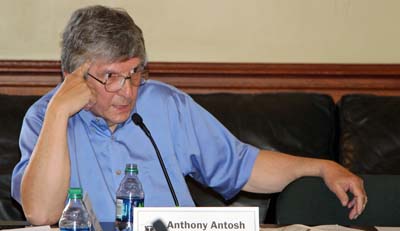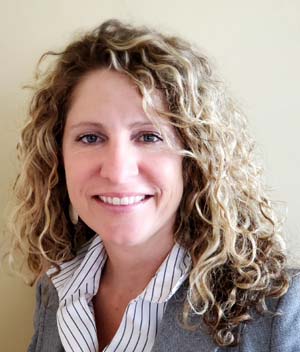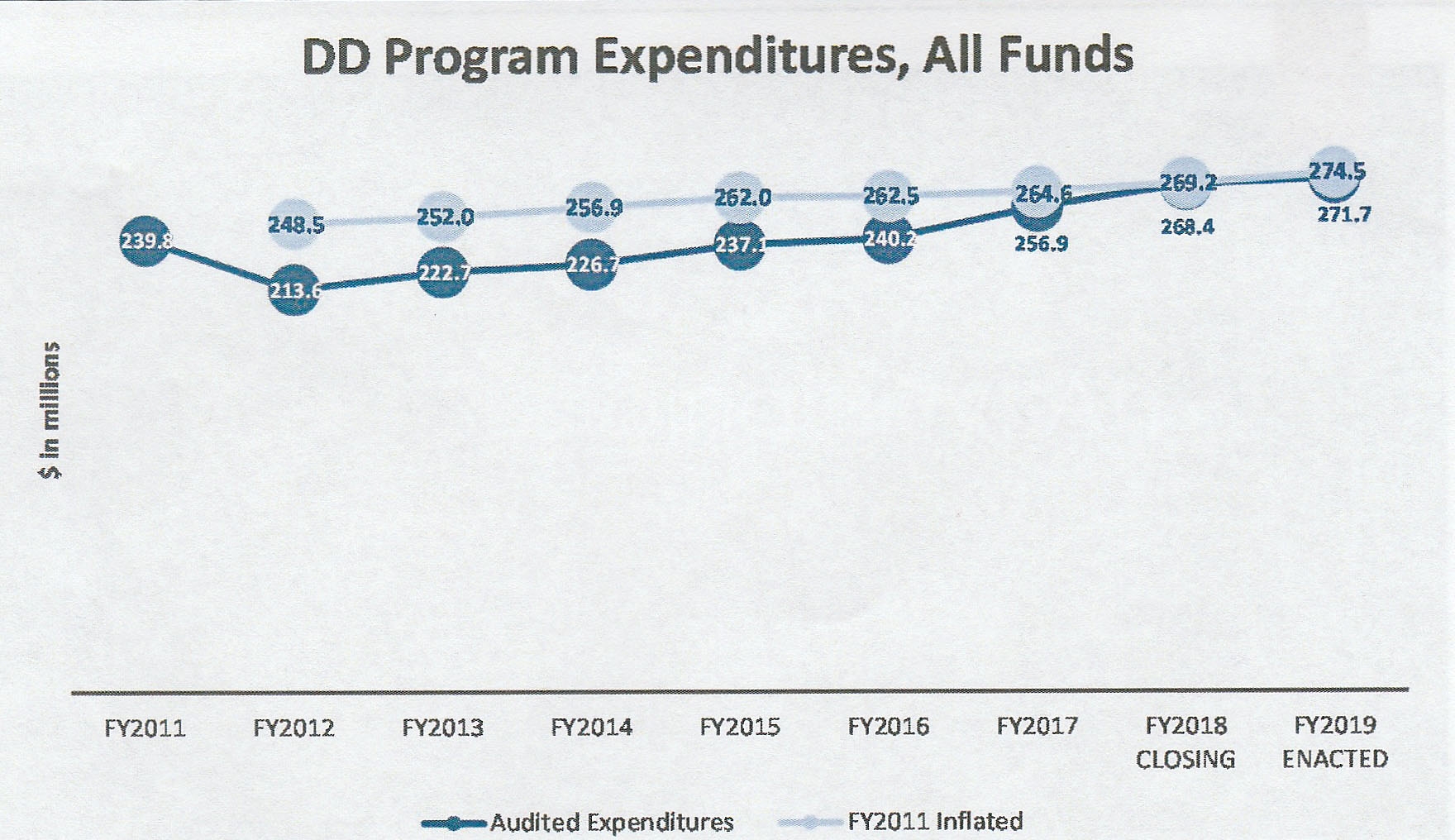RI “Not Far” From Institutional System Of DD Services, Antosh Tells Legislative Commission
/A. Anthony Antosh
By Gina Macris
Other than moving people out of institutional living with the closing of the Ladd School in 1994, Rhode Island hasn’t made life appreciably better for adults with developmental disabilities, according to state’s most prominent academic in the field.
A. Anthony Antosh, director of the Sherlock Center on Disabilities at Rhode Island College, said that every week he gets calls from parents who say how “complicated it has gotten” to deal with state-funded services and “how unstable the system is.”
“Our system is not institutional, but it’s not far from that,” Antosh said. He has been active as an educator and researcher in the field of developmental disabilities since the 1970s and was a plaintiff in a lawsuit that ultimately closed the Ladd School.
If the state transfers control of its services – even partially -- to the people who are served, “you begin to change what the system looks like,” he said. Individuals will become “more responsible for themselves.”
Antosh made the comments May 22 as a member of the Project Sustainability Commission, a special legislative commission studying the current state of developmental disability services. Antosh and other commissioners outlined their reform suggestions at the session.
He zeroed in on a requirement now in place that sets out ratios for staffing according to the degree to which a person is perceived to be disabled – a “naive notion” in his view. The ratios allow one-to-one or small group staffing only for the most challenged individuals and were designed for day care facilities or sheltered workshops.
The funding rule remains in place even though the state in April entered the sixth year of a ten-year agreement with the U.S. Department of Justice requiring it to change to an integrated, community-based system of care. The last sheltered workshop in Rhode Island closed last year.
Antosh said an alternative structure could be a community support team responsible for a certain number of people. The team would figure out how to arrange its time to meet the individual needs of its clients in the community.
DD Council Weighs In
Kevin Nerney, executive director of the Rhode Island Developmental Disabilities Council, also said that he wanted a system “driven by the person and the family.”
There is much talk about “person-centered planning,” he said, but “sometimes, the person is at the center and the other people are doing the planning.”
Nerney recommended that the person receiving services and the family take the lead in drawing up a plan for life in the community. They would be guided by an independent facilitator, not by someone who works for the state funding agency or a private service provider.
The individual and the family would have control over the budget assigned to them and would be able to hire whom they choose to provide paid supports.
Until recently, Nerney said, individuals and families who direct their own services were allowed to use the money allotted to them only to pay for support workers.
Those who choose to receive services from an agency should at least know how much money goes into each category of support, Nerney said.
Antosh, meanwhile, said that funding should be organized by function so that individuals and families have a clearer idea of its purpose.
The notion that plan-making and case management should be separated from the funding agency and the service provider is already embedded in federal Medicaid rules under the title of “conflict free case management.”
“Health Home” Merits Debated
The state Department of Behavioral Healthcare, Developmental Disabilities and Hospitals (BHDDH) wants to set up a Medicaid-funded “Health Home” as an independent planning and case management entity for persons with developmental disabilities.
But some commission members have wondered aloud whether a Health Home would be just another layer of bureaucracy.
And Nerney said most people don’t even like the term “conflict-free case management.”
Antosh agreed that “conflict-free case management” should be made simple. The state should have a list of trained independent facilitators, or “navigators,” as he referred to them, to help individuals and families develop plans and mediate any differences among those contributing to an individual plan.
Individuals and families should have a choice of managing their own services, signing up with an agency, or designing a customized combination of self-directed supports and agency-managed services, he said.
Tom Kane, Left, With Antosh
Tom Kane, who represented a service provider’s perspective, agreed that the people should be in control, with the services following their needs.
To lay the groundwork for real choice, the system should help adults with developmental disabilities “discover their options,” and providers should follow their lead in delivering services, said Kane, CEO of AccessPoint RI.
Kane recommended a concerted statewide marketing campaign aimed at employers that promotes adults with developmental disabilities as an enthusiastic and reliable workforce.
Several other recommendations from Kane echoed recurring issues among members of the commission including:
A need for funding that reflects the real costs of services, as well as salaries that will attract and retain talented employees. Recommendations that arise from the review of the funding model and rates that is now underway should be presented to the General Assembly “without edit,” Kane said, and should be used as the basis of funding a new system. He noted that the last review came up with recommendations which the legislature never used.
Concerns about a lack of housing options
A need for consumers’ access to technology to help them achieve the greatest independence possible.
A Call For A More Stable Funding Cycle
All the commission members, except Antosh, favor annualized budgets for individuals. Antosh said arrangements should be made in two-year increments for funding and services. He also said that there should be a single streamlined application process, no matter the source of the funding, which may come from BHDDH, the Office of Rehabilitative Services, or the Department of Labor and Training.
Families of youngsters deemed eligible for adult services while they are still in high school should also get a budget for exploratory activities, because they don’t know what choices are possible until they experience various options, he said.
The state now determines funding levels annually on paper but reserves the right to change the amount actually released for spending every three months – on a quarterly basis. Families and providers agree that the quarterly allocation - the only one like it in the nation – is a major impediment to the systematic planning necessary for a stable system of supports.
Kane provided some history on the quarterly allocations:
In 2010, he said, payments to private service providers ran over budget and the state told them their reimbursements would be cut for two months – one month retroactively – to make up the difference.
Some providers sued, Kane said, arguing that the state was still obliged to fulfill its contract with them. The providers won, but the next year, in 2011, BHDDH introduced quarterly allocations along with Project Sustainability, the fee-for-service system that significantly reduced reimbursements and is at the center of the commission’s deliberations.
Mental Health Services Lag
The issue of mental health received considerable attention, with Nerney recommending that the system develop and implement a variety of strategies to prevent crises or resolve them once they occur.
Nerney supported the idea of a mobile crisis unit that he said was suggested by Gloria Quinn, Executive Director of West Bay Residential Services, at the previous commission meeting May 6.
Quinn recommended convening a group to explore successful practices in supporting those with complex mental health and behavioral needs in the community, minimizing the need for excessive psychiatric hospitalization.
Rebecca Boss, the BHDDH executive director, and Kerri Zanchi, the Director of the Division of Developmental Disabilities, both indicated they are aware of a need for greater support and intervention in the area of behavioral health for persons with developmental disabilities.
“We don’t have a good handle on the needs of families in crisis,” Zanchi said.
The assessment tool that BHDDH uses to determine funding levels, the Supports Intensity Scale (SIS), garnered a new round of criticism, despite efforts in 2016 to reframe the questions it asks to better identify support needs and the re-training of all the social workers who conduct the highly scripted interviews..
L To R, Kerri ZanCHI, Brian Gosselin, Acting Consent Decree Coordinator; Christopher Semonelli, Peter Quattromani. All Are Commission Members
Critic Says Assessment Method Is “Demeaning”
Peter Quattromani, executive director of United Cerebral Palsy RI and spokesman for the Providers Council, said the state should return to using the Personal Capacity Inventory to identify funding needs because it reflects a more collaborative approach than the SIS.
Quattromani said he sat in on several SIS interviews and found the SIS to be a “very demeaning experience” with “very intrusive questions.” In some cases the interview varied, depending on who was asking the questions, he said.
Antosh said when parents experience the SIS for the first time, “they are absolutely horrified by it.”
He suggested that when the SIS was first piloted, it was not intrusive. It was “a conversation”, albeit a lengthy one, lasting for or five hours, Antosh said. Afterward the responses were correlated with funding needs.
Antosh said the SIS was designed to help professionals develop support plans, not as a funding tool, even though Rhode Island and other states use it that way.
Antosh said he would recommend that Rhode Island design its own assessment tool, not necessarily eliminating the SIS but using multiple factors to determine funding, including an exploration of behavioral health issues and other areas not covered in the SIS.
Heather Mincey, assistant director of the Division of Developmental Disabilities, said not all the comments abut the SIS process she has received from families have been negative, with some parents saying it “wasn’t all that bad.”
The May 22 meeting concluded individual members’ presentations on recommendations for change, which will be reviewed and consolidated along common themes and incorporated into a plan for moving forward, said the Commission chairman, Sen. Louis DiPalma, D-Middletown.
He said he anticipated a five-year process for implementation, with the aim of making Rhode Island achieve top national ranking among state systems of developmental disability services.
In the meantime, DiPalma said that he next commission meeting, on June 18, will feature remarks by the state Director of Labor and Training, Scott R. Jensen; and the CEO of the Rhode Island Public Transit Authority, Scott Avedesian Employment and transportation are two topics that have sparked a lot of complaints, DiPalma said. He said he expects the commission to continue meeting into July.
















